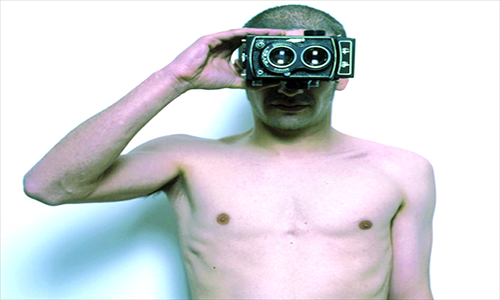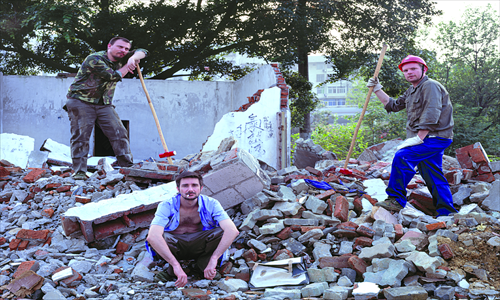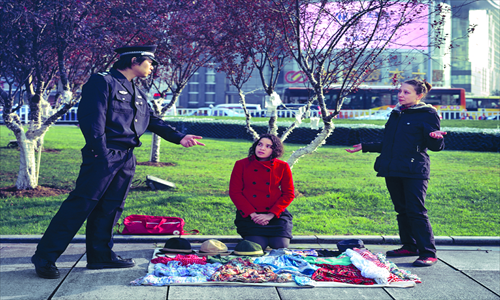The laowai's burden

Benoit Cezard
With hammers in hand, wearing shabby clothes and "PLA shoes," the green canvas sneakers commonly worn by manual workers in China, three white men were dismantling an old house in Wuhan, capital of Central China's Hubei Province.
The men were temporary models for Benoit Cezard, an amateur photographer from Metz, a city in northeast France. The scene is from a set of pictures titled China 2050.
"With the decline of the US and Europe and the strong economic development of China, a big wave of new immigrants, coming from the old superpowers, arrived in the Chinese mainland," said the statement attached to China 2050.
Under Cezard's cameras, these Westerners have become migrant construction workers, urban dustmen, gardeners, tricycle drivers and street vendors chased by chengguan, urban management officers.
"China is undoubtedly on its way to becoming a global super power. The middle classes live a comfortable life and some people have already become rich," Cezard told the Global Times.

Cezard is convinced that by 2050, China will be the premier economic superpower, as many experts have predicted. He believes that most Chinese people will own a car, will be able to travel overseas, and that everyone will have access to social services.
The five pictures that he uploaded on the Internet in April have aroused widespread attention, as well as criticisms from both Chinese and foreigners.
The comments are mixed. Some called the pictures "entertaining" or "ridiculous."
"This is a reminder to white people what the consequences of high welfare and laziness/complacency are," one commentator claimed at chinasmack.com.
Some said the photographer was flattering China, while others said he has "ulterior motives" to hype the "China threat." Some foreigners warned their corporations not to sell jobs overseas, while others stated this could never happen in reality.
Cezard disagrees with many of the comments, but is pleased to have sparked a discussion. "It has resulted in independent thinking and different opinions."
But he didn't set out to make a fuss. "I had no specific purpose. I just wanted to try something different from realistic works. And I shot these pictures for fun. But gradually, I found it more and more interesting," he said, adding that the models also liked it and some people volunteered for the poses.

Love and travel
Cezard, who came to China in October 2006, is a French teacher at the Alliance Francaise in Wuhan. By now he can hold simple conversations in Chinese. He met his Chinese wife, Liu Xuewei, in 2006, who is now studying for a PhD in Intercultural Communication in Wuhan University, and they married three years later. She told the Global Times that their shared love of art drew them together.
During his travels around China with his cameras, Cezard also fell in love with the country and its people. While living in Dulong village, a poor and remote village in Yunnan Province, and spending three weeks in Pengjiazhai, a mountainous village in Hubei, he tried to record the ordinary people's real lives with his cameras.
Inspired by two Chinese photographers Li Yu and Liu Bo, who have gained some popularity by reenacting scenes taken from local newspaper stories, Cezard started to try surrealist pictures and the idea of blending foreigners and migrant workers occurred to him.
Designing the sets, finding models, and purchasing costumes and props took a year, and, with his wife's help, cost him about 400 to 800 yuan a photo.
"Thanks to the almighty Taobao, I could find all the props. This is also one point why the country is so attractive to me," he said. Some large objects like tricycles, or mamu in the Wuhan dialect, he had to rent. The models are friends and colleagues in Wuhan. They all acted for free.
Social backbone
The pictures aroused many reposts and comments. Some media even contacted Cezard to interview him or with requests to publish his works.
"I'm surprised I got so many reactions. I wasn't deliberately seeking the spotlight. I am happy to take the pictures. They are a record of my life, experience and feelings," he said.
Naturally, he wants more people to see the pictures. But he hopes they can inspire reflection on how to enhance social security and eliminate professional discrimination, rather than just amuse.
Cezard enjoys snapping manual laborers. "Migrant workers are the most hardworking and vivid members of the society. They are the backbone of this country. In China, I have seen many manual workers. They are simple, optimistic and kind, and slave away for the country's construction and development," he said.
Overseas, Chinese work in all manner of fields, from waiters to architects to doctors. But in China, the jobs that foreigners are engaged in are very limited. Cezard believed that more and more occupations will open up to them.
"As I arrived in China, I decided to stay. As long as I can stay here, I'm also willing to do some manual work. I believe many other expats have similar thoughts. We love China. We want to be a part of society," he said.
As a result, he started to present an optimistic view of China. But photography is truly an expensive hobby. Cezard has spent tens of thousands of yuan on equipment, mostly on cameras.
The picture series his wife Liu likes most is not the China 2050 but the ones taken during their honeymoon trip in a remote part of Yunnan Province.
Sometimes the pictures have landed them in trouble. Previously, Cezard took some black and white pictures of laborers in Wuhan. Some Chinese were paranoid that he meant to display the ugly side of China, which made him feel hurt.
"Many foreigners we know love China very much. We hope some Chinese can eliminate their stereotypes about them as well," Liu told the Global Times.